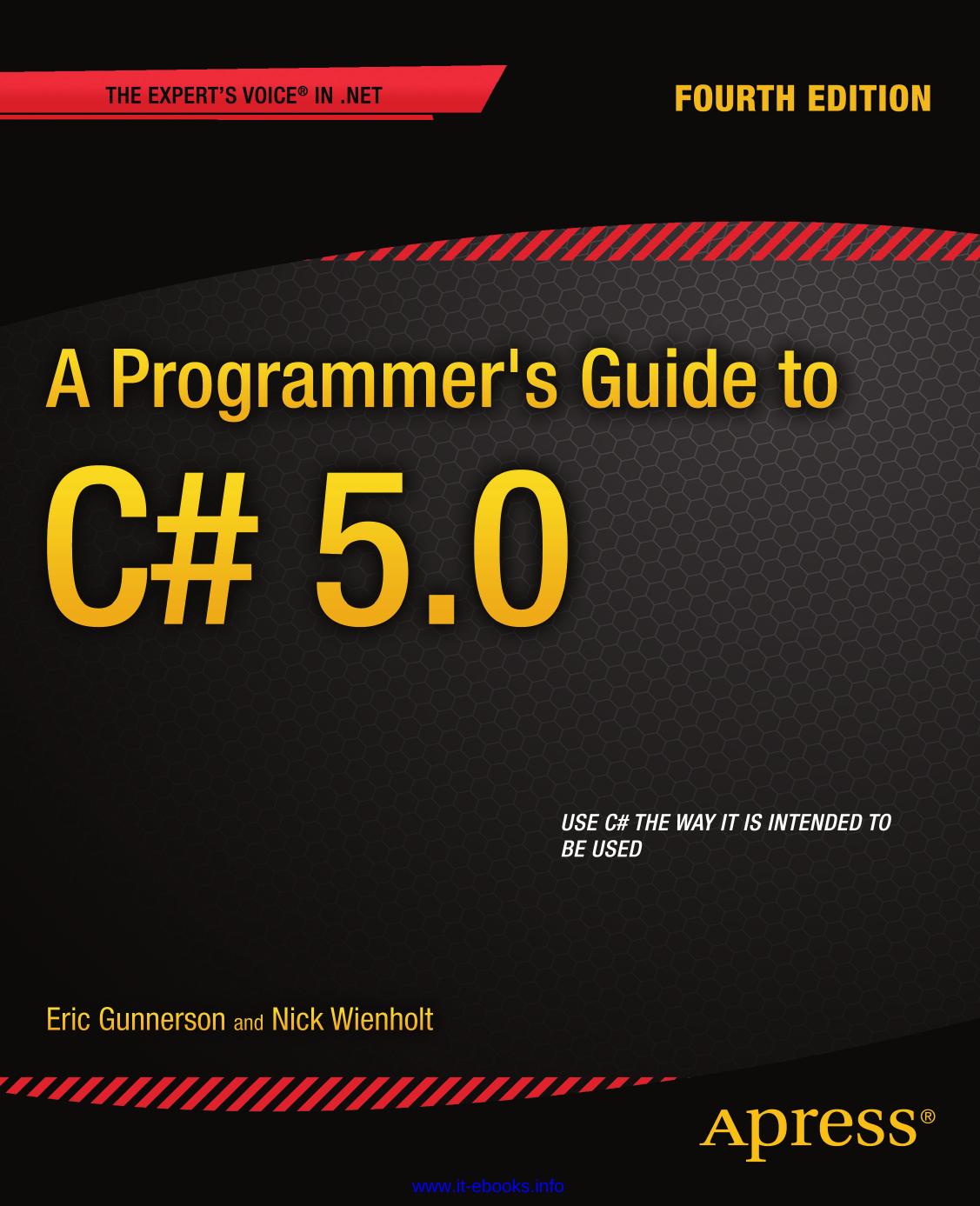A Programmer's Guide to C# 5.0 by Eric Gunnerson & Nick Wienholt

Author:Eric Gunnerson & Nick Wienholt [Gunnerson, Eric & Wienholt, Nick]
Language: eng
Format: epub, pdf
Tags: C#, Computers, Programming, Microsoft Programming, Programming Languages
ISBN: 9781430245933
Publisher: Apress
Published: 2012-11-07T05:00:00+00:00
CHAPTER 24
Dynamic Typing
The vast majority of code written with C# is strongly typed. But there are scenarios where a strongly typed system doesn’t work, such as when dealing with some COM objects or working with dynamically typed languages. This chapter explores the support that C# provides for dynamically typed programming.
The dynamic Keyword
Dynamic provides a new way to declare variables. Consider the following code:
Employee george = new Employee("George", 15, 10M);
var jane = new Employee("Jane", 13, 9M);
dynamic astro = new Employee("Rastro", 7, 1M);
The first line declares that George is of type Employee. The second line uses var to declare that the type of jane will be whatever the type of the expression is, which is also Employee in this example.
The dynamic keyword is very different, in that it does not equate to a specific type. It means “I don’t know what type this thing is, so just keep a reference to it. We’ll figure out what it can do later.” Since all of these variables are references to instances of the Employee class, you can write the following:
Console.WriteLine(george.Name);
Console.WriteLine(jane.Name);
Console.WriteLine(astro.Name);
When you write george.Name or jane.Name, it means something very simple. Since you know that the type is Employee, you know that there is property named Name, and you merely call the getter of the Name property of the instance.1
When you write astro.Name, it means something very different; since you declared astro to be dynamic, all you know is that it is an instance of some object, but you don’t know what that object can do when you compile the code.
To evaluate astro.Name, you need to do the following:
Determine whether astro has a member named Name.
Determine whether the usage of astro.Name is valid in this context.
Figure out that Name is a property and has a specific get method.
Call the property getter.
Determine how the return type of the property getter should be treated and whether any conversions are required.
Download
A Programmer's Guide to C# 5.0 by Eric Gunnerson & Nick Wienholt.pdf
This site does not store any files on its server. We only index and link to content provided by other sites. Please contact the content providers to delete copyright contents if any and email us, we'll remove relevant links or contents immediately.
| Coding Theory | Localization |
| Logic | Object-Oriented Design |
| Performance Optimization | Quality Control |
| Reengineering | Robohelp |
| Software Development | Software Reuse |
| Structured Design | Testing |
| Tools | UML |
The Mikado Method by Ola Ellnestam Daniel Brolund(23572)
Hello! Python by Anthony Briggs(22703)
Secrets of the JavaScript Ninja by John Resig Bear Bibeault(21524)
Kotlin in Action by Dmitry Jemerov(20570)
Dependency Injection in .NET by Mark Seemann(20491)
The Well-Grounded Java Developer by Benjamin J. Evans Martijn Verburg(20387)
OCA Java SE 8 Programmer I Certification Guide by Mala Gupta(19537)
Algorithms of the Intelligent Web by Haralambos Marmanis;Dmitry Babenko(18334)
Grails in Action by Glen Smith Peter Ledbrook(17458)
Adobe Camera Raw For Digital Photographers Only by Rob Sheppard(16976)
Test-Driven iOS Development with Swift 4 by Dominik Hauser(11242)
Becoming a Dynamics 365 Finance and Supply Chain Solution Architect by Brent Dawson(8072)
Microservices with Go by Alexander Shuiskov(7841)
Practical Design Patterns for Java Developers by Miroslav Wengner(7739)
Test Automation Engineering Handbook by Manikandan Sambamurthy(7705)
Angular Projects - Third Edition by Aristeidis Bampakos(7183)
The Art of Crafting User Stories by The Art of Crafting User Stories(6642)
NetSuite for Consultants - Second Edition by Peter Ries(6562)
Demystifying Cryptography with OpenSSL 3.0 by Alexei Khlebnikov(6326)
